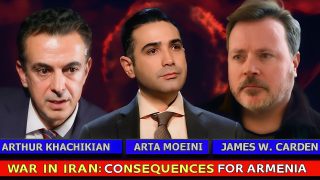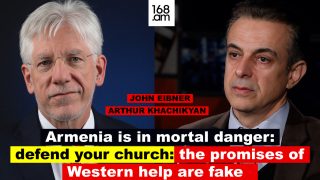Downing of the Russian fighter jet by Turkey further complicates the situation in the region and pushes the resolution of the NK conflict to the backburner. Nelli Babayan

Dr. Nelli Babayan is the guest expert at “168 Hours”. She is Fellow at the Transatlantic Academy in Washington, DC, where she studies Russia’s relations with the United States and the European Union. She is also an Associate Fellow at the Freie Universität Berlin, Germany where she has been a senior researcher and lecturer in 2012-2015. Her research and teaching interests include democratization/democracy promotion (by the US and the EU), transatlantic relations, post-Soviet politics, and internet politics.
-Dr. Babayan, the world order is changing and these changes also influence our region. Armenia is in a very vulnerable situation given the conflict and escalated situation on the border with Azerbaijan and closed borders with Turkey. In addition, Armenia depends on Russia for its security, while Russia’s conflict with the West and its air campaign in Syria and worsening relations with Turkey further complicate matters. It is obvious that contrary to its assurances Russia does not ensure Armenia’s security. How can Armenia find new models of security taking into consideration also the fact that Armenia is under pressure from Russia?
–First, it has become fashionable to talk about the changing world order. Yet, it seems to me that we often do not realize how that world order may be changing or what the main challenges are. There are definitely shifts in the post-WWII order, where nation states were the main actors on the international arena and such institutions as the UN, WTO, or NATO were created to uphold the principles of that order. Those shifts now come mainly from non-state actors, and more specifically terrorist organizations, which seem to be successful in shaping political agenda of many countries. Yet, Russia has been exerting influence over Armenia regardless of such shifts or the emergence of new actors.
Second, we need to finally realize that Russia’s influence over Armenia feeds off Armenia’s own political and security situation. The protracted Nagorno Karabakh (NK) conflict creates the perfect environment for Russia to exercise power and influence Armenia’s foreign policy, given the latter’s political issues and limited economic power in comparison to Azerbaijan. At the same time, it would be naïve to assume that Russia would be ensuring Armenia’s security in case it stops being in Russia’s interests and currently it is busier with its operations in Ukraine and Syria. Downing of the Russian fighter jet by Turkey further complicates the situation in the region and pushes the resolution of the NK conflict to the backburner. Thus, it seems that a “new model” for Armenia’s security can be found with the resolution of the NK conflict and that can be done only through meaningful negotiations and compromise from all conflicting parties. In one way or another, the resolution of the NK conflict would allow Armenia to decide on its own course of foreign policy without security or Russian constraints. Additionally, it would not only facilitate trilateral regional cooperation but would also likely allow Armenia to move towards meaningful democratic reforms as the incumbent would not have the opportunity to justify violations of democracy with security concerns.
-It is well known that the unresolved NK conflict is the melting point for Armenia. For instance, before the membership to the Eurasian Economic Union (EEU) the public and political agenda in Armenia were preoccupied with the question whether Armenia become a member of the EEU with NK. Taking into consideration this conflict can the EU or the United States provide Armenia with guarantees giving Armenia an opportunity to have relations with the EU, the West without losing NK as Ukraine lost its Crimea and Donbass, and Georgia lost its South Ossetia (SO) and Abkhazia? Political experience shows that post-Soviet countries pay a price for free decision-making: they lose parts of their territories, since almost all these countries have territorial conflicts, which are tools in the hand of Russia.
–First or all let me make it clear that my answer here is based on the international norms and regulations rather than emotional or humanitarian considerations. You are correct saying that territorial conflicts in the post-Soviet space are often used as tools of influence by Russia. Yet, the parallel you draw between, as you say, “losing NK” and Ukraine losing Crimea or Georgia losing South Ossetia and Abkhazia, is not entirely valid. According to the international law and a number of UN resolutions, NK conflict violates the territorial integrity of Azerbaijan and not Armenia. Equating NK’s situation from Armenia’s perspective to the ones of Ukraine and Crimea and Georgia and SO and Abkhazia is rather inconsistent, since unlike Ukraine and Georgia, Armenia’s territorial integrity is intact. At the same time, while Ukraine, Georgia and Azerbaijan are insisting on the principle of territorial integrity, Armenia is supporting the principle of self-determination. Hence, its votes against the UN General Assembly resolution in 2014 of supporting Ukraine’s territorial integrity and invalidating Crimea’s annexation or in 2013 of supporting Georgia’s territorial integrity and the right of return of internally displaced persons to the self-proclaimed republics of SO and Abkhazia. Yet, perhaps it is this understanding of the intricacies of international law that Armenia still has not recognized NK’s independence.
I am not sure what the bases were for the expectations of having NK also join the EEU, as you mention. The EEU’s treaty is clear that its members are states and the common economic area is comprised of their territories. As NK is not recognized by any UN member, and is not de jure included in the territory of Armenia, including NK in the EEU would contradict its own treaty. Nevertheless, as we could see Armenia did become a member of the EEU and NK conflict per se was not a hindrance to that membership. However, it has given the opportunity to Russia to exert pressure in its efforts to divert Armenia from initialing the Association Agreement with the EuU.
As for the EU and the United States: you are asking if they would provide security guarantees to Armenia to alleviate Russia’s influence. However, it seems you are omitting from this equation the importance of Azerbaijan for both the EU and the USA. Azerbaijan is a major partner for the EU’s plans in diversifying its energy sources. Thus, expecting the EU to provide any security guarantees to Armenia at the expense of Azerbaijan’s interests is simply unrealistic. Nevertheless, given recent developments in the Eastern Partnership, the EU still seems willing to cooperate with Armenia and assist in its development.
-How do you assess Russian-Armenian relations? How could Armenia balance its foreign policy?
–Blaming Russia in post-Soviet maladies has become routine. The same is true about Armenia’s challenges and its relations with the EU. While there is no doubt that Russia exerts asymmetric power over its post-Soviet counterparts and considers them within its sphere of control, we need to remember that Russia often capitalizes on the internal political and economic situation of these countries. Unlike the EU, Russia’s assistance does not come with democratic or human rights conditionality. Given the state of democracy in Armenia, it should not be surprising that Armenia’s government would opt for the style of governance similar to Russia’s rather than the EU’s. Thus, the underlying point here is that while Russia may need Armenia as its last “stronghold” in the South Caucasus, given the presence of military bases, the Armenian government may need Russian “pressure” to justify its increasingly authoritarian tendencies.
-How do you assess mediation efforts of the United States in NK conflict? Are these efforts enough?
–Regardless of the mediators’ efforts the resolution of conflicts is in the hands of conflicting parties and their willingness to cooperate in search of a resolution and compromise. Unfortunately, at the moment such cooperation or compromise cannot be detected in either the rhetoric or the actions of the conflicting parties. Bellicose statements, coming mostly from Azerbaijan, do not contribute to conflict situation either.
By Araks Martirosyan

























